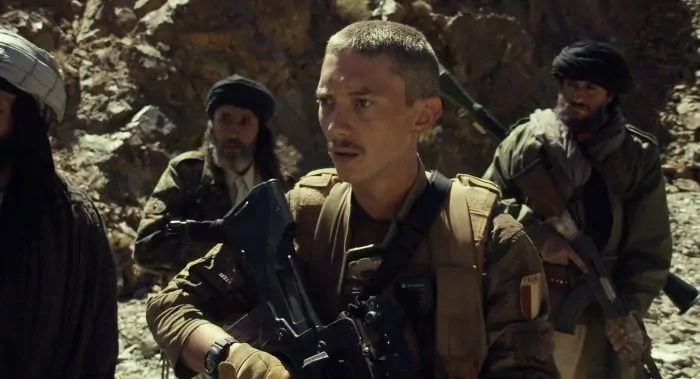Neither Heaven Nor Earth (2015) is a French-Belgian film focusing on NATO troops in Afghanistan, with more than a nod to the ancient history of this part of the world, and to the vagaries of war. It is a first-rate psychological thriller, and I recommend it highly.
Captain Bonassieu and his French troops are in Afghanistan as part of a NATO mission to provide effective security across the country (2003 to 2014). The film opens as Bonassieu’s men are on routine patrol in 2014 from their base camp and barebones outposts overlooking a remote valley.
Occasional gunfire expedites efforts to locate the enemy, snipers almost invisible on rocky hillsides. Bonassieu is concerned about one young soldier, William Denis, whose wife Sarah is expecting their first child. We see troops staying in touch with their families via telephone, similar to American troops in 1993 Somalia in “Black Hawk Down” (2001). The terrain is lean and unforgiving to mistakes, but the troops are well trained and disciplined.
And then Denis goes missing. All procedures and safety checks are reviewed. Bonassieu meets with the village chief to see if local civilians know anything, and their evasiveness puts him on alert. When another soldier goes missing, fear and suspicion increase.
Experiencing how the captain handles this growing crisis is at the heart of the film, and the character study is fascinating. Bonassieu is career military, a man who knows his troops, knows the terrain and knows his job. Men must not go missing. He is accountable to High Command. He is accountable to pregnant wives. He is accountable to his men, who believe in him completely.
A combination psychological thriller and ghost story, “Neither Heaven Nor Earth” reminds us that this is a part of the world where early conquerors have failed since the time of Alexander of Macedonia. This terrain may hold mysteries older than time itself.
A chance encounter with the enemy reveals stunning information. The language skills of the captain’s interpreter, as well as the Taliban’s willingness to start a dialogue, lead to a sharing of information. The Taliban have lost men as well, men whose bodies cannot be found either. Still suspicious of each other, both sides look at the villagers with narrowed eyes.

This is a film with relatively little violence but with topnotch suspense. Soldiers are trained to contend with waiting for battle and with battle itself, but not the quiet disappearance of their military brothers without a trace. Did men desert from both sides? Have the French and the Taliban been too lenient with the villagers?
Sylvain Verdet’s cinematography combines with the use of digital video and night-vision cameras to emphasize the tension of having a tightly disciplined environment invaded by unknown forces. Colors fade into each other – equipment, outposts, hills, valleys, rocks, fog, human faces. The strangeness of objects under night lights. Four men have disappeared. Taliban forces have lost more. The captain’s demeanor changes; doubts creep in. Discipline starts to unravel.
In a powerful sequence, one of the soldiers connects speakers to the base camp’s sound system and plays pulsating house music. Stripped to the waist, he dances in trance, seeking relief – wisdom – comfort.
Bonassieu uses his laptop to ask High Command to send a chaplain, who arrives by helicopter. Sparks fly immediately. The captain’s idea of what a chaplain is supposed to do conflicts with the pastor’s concept of what men on the front lines need. They spar with words.
This film reminds us that this is a part of the world where early conquerors have failed since the time of Alexander of Macedonia.
As the men listen, the chaplain reads: “While the men were in a deep slumber, a voice came unto me. It whispered and said Man’s life on earth is that of a soldier, his days, those of a hireling. I was at ease but he has shaken me… His troops mobilize and encamp around my tent…”
Not exactly words the captain wants to hear. The next morning Bonassieu sends the chaplain back to Command via helicopter. NATO troops redouble security measures and hunker down in their outposts, using all available technology to prevent further occurrences. Tension mounts with each subsequent revelation.
A brilliant performance by Jeremie Renier as Captain Bonassieu in a harrowing situation, as he balances what he knows with what is happening. Thoughtful, haunting, not to be missed.
Film stills courtesy Film Movement.


